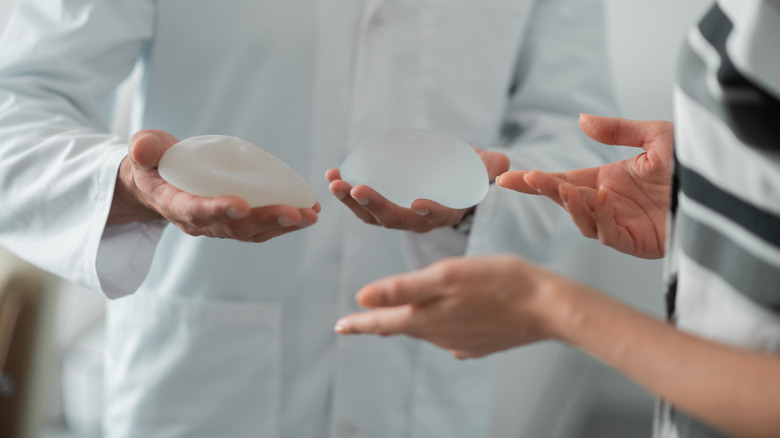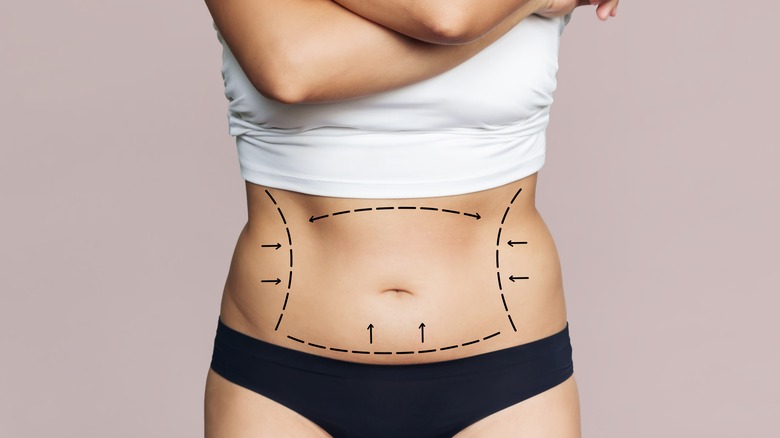Dr. George Bitar Dispels The Top 3 Myths About Plastic Surgery - Exclusive
When you think about plastic surgery, breast implants and Botox might come to mind. Many assume that plastic surgery is all about vanity or that only women get work done. But plastic surgery covers a wide range of procedures, and people go under the knife for many different reasons. Some people seek plastic surgery for cosmetic reasons; others may want it due to an injury, birth defect, body changes caused by illness, or to receive gender affirmation surgery (via American Society of Plastic Surgeons). And contrary to popular belief, "More men are having plastic surgery, as the stigma has been lifted for them," said Dr. George Bitar, a board-certified plastic surgeon.
Dr. Bitar has over 10,000 cosmetic procedures under his belt and is the founder and medical director of the Bitar Cosmetic Surgery Institute. He has trained other doctors, lectured at medical conventions, contributed to several peer-reviewed medical journals and books, and co-authored a book for other plastic surgeons. In an exclusive interview with Health Digest, he explained the top three myths about plastic surgery and why we should stop believing them.
Myth 1: Silicone breast implants are dangerous
When comparing saline versus silicone breast implants, both are considered safe (via Mayo Clinic). According to Dr. George Bitar, "[Silicone breast implants] are equally as safe as saline. Many women prefer them because the implant is pre-filled with silicone gel, and it more closely replicates the look and feel of human fat. There have been thousands of studies that attest to their safety."
But breast implants do not come without risk. Both saline and silicone breast implants have similar risks, including scar tissue, pain, infection, changes in skin sensation, and implant leakage or rupture (via Mayo Clinic). If you're considering breast augmentation surgery, Dr. Bitar recommends speaking with a trusted, board-certified plastic surgeon who will be able to help determine if surgery is right for you as well as if saline or silicone implants would better suit your specific breast anatomy and body type.
Myth 2: Fat deposits after a liposuction procedures will eventually return
"Once fat is suctioned out of a specific area, the fat cells will not grow back. In that sense, liposuction is permanent," said Dr. George Bitar. In other words, fat deposits should not return if the patient maintains their weight after the procedure. "If someone puts on weight by increasing caloric intake, there will still be remaining fat cells that expand. Once you have a liposuction procedure, it is important to maintain stable body weight," Dr. Bitar explained.
To keep your liposuction results and help maintain your weight, the American Society of Plastic Surgeons advises you to stick to all post-procedure directions given by your surgeon. They also recommend following a healthy diet full of protein and healthy carbohydrates, drinking lots of water to stay hydrated, never skipping meals, eating various small meals throughout the day, and getting regular exercise.
Myth 3: Scarring from a facelift will be evident
Many people assume — incorrectly — that plastic surgery is always obvious afterward. "A skilled board-certified plastic surgeon ... [is] trained to conceal scars in contours or folds of the skin that are not noticeable," said Dr. George Bitar. "In my facelifts, I hide the scars inside and around the ears in the hairline to allow my facelift patients afterward to wear their hair in a ponytail." Dr. Bitar recommends choosing an experienced board-certified surgeon to ensure minimal scarring from your procedure.
You can also ask your plastic surgeon for advice and product recommendations on how to minimize potential scarring. Some surgeons suggest lifestyle changes to help with scar reduction, like not smoking tobacco or vaping, avoiding sun exposure, always using sunscreen, staying hydrated, eating healthy, and utilizing an excellent facial moisturizer (via North Raleigh Plastic Surgery).
Find out more about Dr. George Bitar and his services on the Bitar Cosmetic Surgery Institute website.




